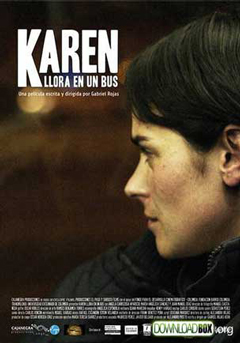
 |
|
|
|
The Film Movement people have found a winner in the recent movie from Colombia, Karen Cries on the Bus (Karen llora en un bus). It seems that many South American pictures we Yanquis see deal in radical politics or the drug trade, like the excellent Maria Full of Grace from 2004. This unassuming but deeply affecting drama is a Colombian take on the theme of An Unmarried Woman. Deciding that she's uhappy in her marriage, a housewife leaves her husband to find a new life in Bogotá. Unlike the upscale society woman of the Paul Mazursky movie, this fugitive spouse finds that leaving her relationship carries the threat of being de-classed, turning into a pauper on the street. Written and directed in a clear, economical style by Gabriel Rojas Vera, Karen Cries on the Bus is a surprisingly satisfying drama. 
Karen (Ángela Carrizosa) arrives in Bogotá literally crying. She is completely alone in her struggle to support herself. Her mother disregards her wishes and takes her husband's side of things. They are both convinced that Karen is incapable of supporting herself. To be rid of them Karen moves into a humble rented room and searches for work. Her only friend is Patricia (Angelica Sanchez), a rather wild-living beautician with two men on her dating list. They become close when Patricia drinks too much one night, and Karen must pick her up off the sidewalk. An avid reader, Karen applies for work at a bookstore. But job-hunting becomes an education in humiliation, especially after she is exploited by an unscrupulous language school. Then Karen's purse is stolen. She is reduced to begging at the bus station, and hits bottom when she is caught shoplifting. Patricia encourages Karen to double date with her. To her surprise Karen meets a successful playwright, with whom she can talk about writing and acting. Just as it looks as if she will land a job, this new boyfriend makes an offer that's difficult to resist. Will Karen give up her independence for the protection of yet another man? An affecting, emotional and instructive show, Karen Cries on the Bus shows a naïve but determined woman struggling to take control of her life. Many Latinas married ten years would already have children, putting independence much further out of reach. But Karen's thoughtless lump of a husband is definitely someone to escape from. Even when he's trying to convince her to come home he invites a business associate to their planned reconciliation dinner. The experience shows Karen that she made the right choice. It is not an easy one. Karen finds hostility in every direction, from the roaches in the bathroom to the café proprietor who doesn't believe her when her purse is stolen. When push comes to shove, Karen proves her acting mettle by breaking down in tears as part of her begging in the bus station. She meets plenty of kind people willing to come to her aid. 
Patricia at first seems like trouble, a bad influence enticing Karen into the habit of sleeping around. Patricia keeps a married man and a young mechanic on her string, and "borrows" money from both of them. Karen only later learns that her best friend has more family complications than she does. The film's stretches credibility only when Karen meets the successful writer who takes an immediate liking to her. For a while it looks as if Karen Cries on the Bus will find an easy out for its beleaguered heroine. But writer-director Gabriel Rojas Vera uses his "Prince Charming" situation to work out an appropriate ending for Karen. Happily, the film does not insist that she suffer a miserable defeat. Ángela Carrizosa is a fine choice to play the curious, adventurous Karen, newly liberated from domestic tyranny. The attractive Ms. Carrizosa is not made up or dressed to turn heads, and can look quite pitiful when the situation demands. Karen does want to transform herself. At one point in the story she allows Patricia to cut her hair short, and we see how the change improves her morale. We come to care about Karen because she possesses a strong sense of dignity. She absorbs abuse and humiliation without complaint, and retains the ability to accept new acquaintances without judging them. Director Vera shows us a major South American city as its ordinary residents might see it. Shiny downtown streets connect to neighborhoods of picturesque but crumbling buildings where even the sanitation is circumspect. Trying to earn a living by handing out flyers in the downtown square, Karen is too shamed to continue after she runs into an old schoolmate. She thinks she has a good system for shoplifting, but the storekeepers have seen them all. They let her go only when she convinces them that she simply cannot summon anyone to pay for what she's stolen. Even the hardened security man relents. But the film is not a series of unrelieved downers. When Karen discovers a new romance she experiences the awkward adventure of shy lovemaking that she probably never knew as a teenaged bride. 1 
Karen Cries on the Bus concludes on a hopeful note, but its unforced message serves notice on the traditional gender roles of Latin America. Women can no longer be kept in ignorance, as chattels; Alicia ya no vive aquí. Buses arrive daily with new fugitives from unhappy domesticity. The message is feminist, but only on the individual level. Vera's movie doesn't make a case for solidarity among women as a class. Each new arrival must fend for herself. Film Movement's DVD of Karen Cries on the Bus is an excellent encoding of this handsomely filmed production. Colors are strong and the sharp image quite attractive. It's a serious, dignified production. Also included is a second short subject, as is Film Movement's habit. The film this time Lessons from the Night by Adrian Francis. The documentary follows a Bulgarian janitor through a city night In Melbourne Australia, where an army of menials, many of them immigrants, do their work.
On a scale of Excellent, Good, Fair, and Poor,
Karen Cries on the Bus rates:
Footnotes:
1. After writing this review, I was surprised by my original review of An Unmarried Woman Karen Cries on the Bus follows through on my observations about the Paul Mazursky picture, almost to the letter.
Reviews on the Savant main site have additional credits information and are often updated and annotated with reader input and graphics. Also, don't forget the 2011 Savant Wish List. T'was Ever Thus.
Review Staff | About DVD Talk | Newsletter Subscribe | Join DVD Talk Forum |
| ||||||||||||||||||